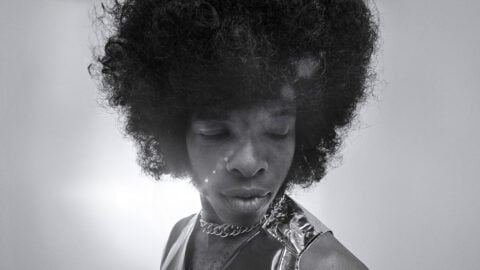Review: Starlet

The life-altering bag or briefcase of money found by a major character remains a favorite plot-jumpstarting move in fiction. Immediately, friendships fracture, class issues boil, and frequently, people die. In Starlet, it’s a thermos full of the stuff, acquired randomly at an old lady’s yard sale by layabout-cum-pornstar Jane (Dree Hemingway, daughter of Mariel and great-granddaughter of Ernest). As she’s rinsing out the ugly old thing, banded rolls of cash totaling about 10 grand tumble out, a discovery she conceals from her roommate Melissa (Stella Maeve) and hyper hanger-on “deal broker” Mikey (James Ransone). All three are just getting by on the fringes of Los Angeles’s pornography underbelly, sharing a chintzy rental, so Jane’s secrecy amounts to betrayal. But Jane reserves the guilt that always seems to accompany the suddenly flush for thermos saleswoman Sadie (elderly first-time actress Besedka Johnson).
Starlet then becomes two movies, one a strange-bedfellows comedy about the almost-cute relationship between the insistent Jane and the put-upon Sadie, the other an almost dully naturalistic exposé of the modern mid-level porn industry in Los Angeles. We see Jane do one XXX scene, but more emphasis is paid to banal off-screen particulars (small talk with co-stars, a producer ignoring the action to field phone calls) than to the sex. An erotica convention’s potential as freakshow is ignored in favor of a few shots of sheepish fans walking up to get a phone-cam pic with Jane (the scene was shot on the sly, with fans apparently unaware Hemingway wasn’t the real thing). To balance out the showily matter-of-fact glimpses of the porn world, the Sadie friendship is given jolts of weirdness, as when, out of nowhere, the old lady blasts Jane with pepper spray.
Director Sean Baker based his movie (co-written with Chris Bergoch) on his own experience moving from New York to Los Angeles to work on the MTV show Warren the Ape, an offshoot of another show he worked on, Greg the Bunny. (Hence the in-joke when Jane and Melissa are baked and watching Greg, and Melissa says “this show sucks.”) Broke, Baker befriended struggling actors and others not unlike Jane and Mikey. Ennui is all, and though the effect is less bludgeoning than in Sofia Coppola’s intentionally vacuous Somewhere, Baker is not immune to coastal stereotypes. His New York movies Take Out and Prince of Broadway were all grit and struggles for a buck, with no magic thermos of money. There wasn’t any pretty-but-generic “livin’ is easy” L.A. vibe, provided here by Radium Cheung’s mustard-smog cinematography and an electronic score by Manual, to leaven matters.
Starlet’s title is versatile. Might it refer to the glam, pedigreed Dree—blonde, blue-eyed, and a fixture on runways and in ad campaigns, now making her “edgy” entrée into acting in a dirty role? The title is obviously a cruel joke on its young female characters (though they really don’t seem to be deferring any reputable acting aspirations), but it might presage something for the opaque Hemingway, whose bursts of improv are hammy and who never musters believable motivations for any of her character’s bewildering actions. There is one character actually named Starlet—Jane’s omnipresent Chihuahua mix. But even that’s a joke, as Starlet’s a male.







